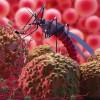
 IJCP Editorial Team
IJCP Editorial Team
Analyzing Infant Gut Microbiome Composition Can Provide Hint for Future Obesity Risk
Research indicates that the human digestive tract harbors nearly 200 distinct species of bacteria, viruses, and fungi. Maintaining a healthy gut is crucial for overall well-being. Recently, a novel study has uncovered a potential link between gut bacteria in toddlers and their likelihood of developing obesity later in life.
Conducted by Gaël Toubon and his team at Université Sorbonne Paris, the study examined data from 512 infants who were part of a larger research project monitoring the lives of 18,000 children born in France. The researchers monitored the Body Mass Index (BMI) of the participants aged 2-5 years. Stool samples were collected from the participants at 3.5 years of age.
The results depicted a positive correlation between BMI scores at the age of 5 years and the ratio of two specific types of gut bacteria (Firmicutes/Bacteroidetes) associated with obesity.
The study highlighted that a higher abundance of Bacteroidetes in the gut was linked to a reduced likelihood of obesity. Conversely, the increased presence of Eubacterium hallii group, Fusicatenibacter, and Eubacterium ventriosum group was identified as a risk factor for higher BMI scores. These findings were presented at the European Congress of Obesity.
Further, the study detected variations in gut bacteria composition between adults with obesity and those who were lean. The findings were consistent with previous evidence and suggested that alterations in the gut microbiota, which contribute to adult obesity, may originate during early childhood.

IJCP Editorial Team
Comprising seasoned professionals and experts from the medical field, the IJCP editorial team is dedicated to delivering timely and accurate content and thriving to provide attention-grabbing information for the readers. What sets them apart are their diverse expertise, spanning academia, research, and clinical practice, and their dedication to upholding the highest standards of quality and integrity. With a wealth of experience and a commitment to excellence, the IJCP editorial team strives to provide valuable perspectives, the latest trends, and in-depth analyses across various medical domains, all in a way that keeps you interested and engaged.














Please login to comment on this article